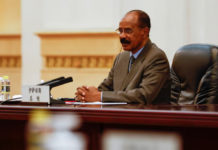
A weekend festival for Eritreans last year in Tacoma encountered a challenge on Day 2: A large crowd protesting the Eritrean government arrived and blocked traffic while some tore down vendor tents and clashed with event-goers.
The Eritrean Association in Greater Seattle (EAGs), which hosted the 49th Annual Eritrean Festival, is now suing 13 named demonstrators and 150 others yet to be named. The lawsuit claims they took part in a coordinated attack in August 2023, where people were allegedly assaulted and hundreds of thousands of dollars in property was damaged.
EAGs filed the lawsuit in late June in U.S. District Court, Western District of Washington, and is seeking more than $75,000 in damages plus legal fees and other unspecified damages. “Vandals’ conduct was intentional, malicious, oppressive, and in conscious disregard of EAGs’ rights, and justifies an award of exemplary and punitive damages,” the complaint reads.
The defendants named in the lawsuit alleged they are being targeted for their activism.
Human rights groups decry conditions in Eritrea, an Eastern African country north of Ethiopia and along the Red Sea. The nonprofit Human Rights Watch said that Eritrea hadn’t held an election since its independence in 1993 and routinely suppresses basic rights, including freedoms of opinion, religion and expression.
Christopher Stockwell, an attorney representing 12 named defendants, provided The News Tribune with a statement from his clients, who said they believed that the Eritrean government manages and controls Eritrean festivals and uses them for fundraising.
“The activists referred to as ‘vandals’ in the lawsuit believe they are being sued not for their actions during the protests, but rather for their activist work as leaders of civic opposition and human rights organizations,” the statement said. “They are journalists, reporters, and prominent activists that were there doing their jobs.”
Attorney Eduardo Roy, who is representing EAGs, called it “absolutely false” that the association and Eritrean government were tied together. A message left with the association was not returned. EAGs is a nonprofit composed of private Eritrean-American residents and refugees, according to the lawsuit. The group is intended to support and build a stronger community of Eritreans who arrived in Seattle due to conflicts in the horn of Africa.
The defendants said they weren’t aware of any arrests resulting from protest activities on Aug. 5, 2023, nor any violent attacks on individuals other than scattered scuffles that were quickly ended.
Disruptions near the Greater Tacoma Convention Center, where the festival took place, prompted the Tacoma Police Department to issue a public statement at the time. Police said that a group of demonstrators vandalized several tent structures and that small disturbances between protesters and festival attendees were “quickly stopped.” Numerous officers were sent to keep the peace.
The protest came around a time when similar festivals elsewhere were being disrupted by demonstrators opposed to Eritrea’s government and human rights record. The outcomes were more serious. Cars were set on fire and more than 50 people were injured during an August 2023 riot in Sweden, according to the Guardian. Dozens of people including 26 police officers, were hurt a month later in Germany, the Associated Press reported.
HEATED PROTEST
Tacoma police reports obtained by The News Tribune detail authorities’ response to the festival. Between 150 and 200 protesters were in an intersection near the convention center around 6 a.m. when officers were called about property being destroyed and set on fire, records show. It’s unclear how officers addressed property destruction, which was reported along Market Street.
Police stayed on the scene into the afternoon and diffused several physical fights and arguments between demonstrators and people connected to the festival, according to records. Some officers described confrontations as minor. It was noted in records that at least three reports were written for assault and another for brandishing a firearm.
A Police Department spokesperson said at the time, “We don’t have any riots or anything of that nature,” The News Tribune previously reported.
The lawsuit filed by the Eritrean Association in Greater Seattle alleged that protesters were armed with metal poles and sticks and pursued festival-goers with weapons. It claimed that they attempted to tamper with festival food and fire-alarm systems, threw chairs and prohibited attendees from checking into their hotels. Two ambulances were called in connection to alleged “assaults on senior citizens, women, and minors—nobody was spared,” according to the suit.
Roy, the attorney representing EAGs, said in an interview that the defendants engaged in “riot-like activity.”
“These were a bunch of bullies and cowards that were intimidating and beating up old people and children,” Roy said. “They all traveled to be part of this violence.”
The protesters arrived by two charter buses, cars and trucks from various parts of the United States, according to the suit. None of the named defendants were from Washington.
Awet Tsehaye was one of the demonstrators and is a named defendant in the suit. He had come from Oklahoma. In an interview, Tsehaye said it was imperative that Eritrean festivals are promoted globally, but he stood against festivals sponsored or mobilized by the government. Such events, he claimed, were part of a widespread effort to control the Eritrean diaspora.
“In name they are festivals, but in reality, they are nothing but the region’s — the government’s — propaganda,” Tsehaye said.
According to Tsehaye, issues did flare up during the Tacoma protest, but he disagreed with the characterizations in the lawsuit. He said that people from the other side — young teens and men — were sent to ignite fights and disturbances with demonstrators who intended only to exercise their right to speak out.
Tsehaye said the subsequent litigation was intended to financially burden activists and to send a message to other Eritrean-Americans who seek changes in Eritrea, including implementation of a constitution, free press and political freedom.
“Eritrean people are a very, very hardworking people. What we are asking is legit,” he said. “Change is much needed and, until we see that change and until Eritrea is governed by the people’s elected representatives, the struggle continues.”
Roy said that the Eritrean Association in Greater Seattle planned to amend its complaint in coming weeks and bring civil action under the Racketeer Influenced and Corrupt Organizations Act (RICO) because defendants had crossed the country to vandalize.
“The reality is that the claims in the complaint are accurate and true,” he said.






